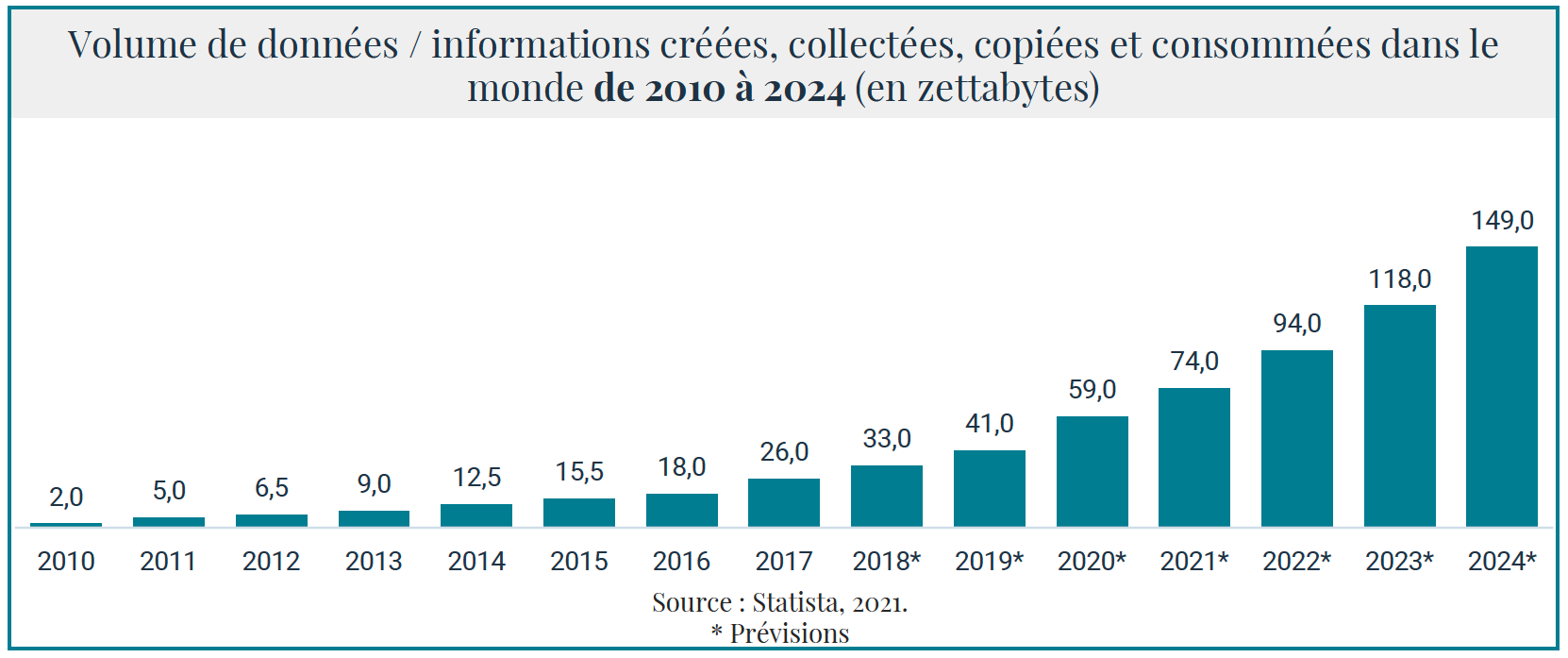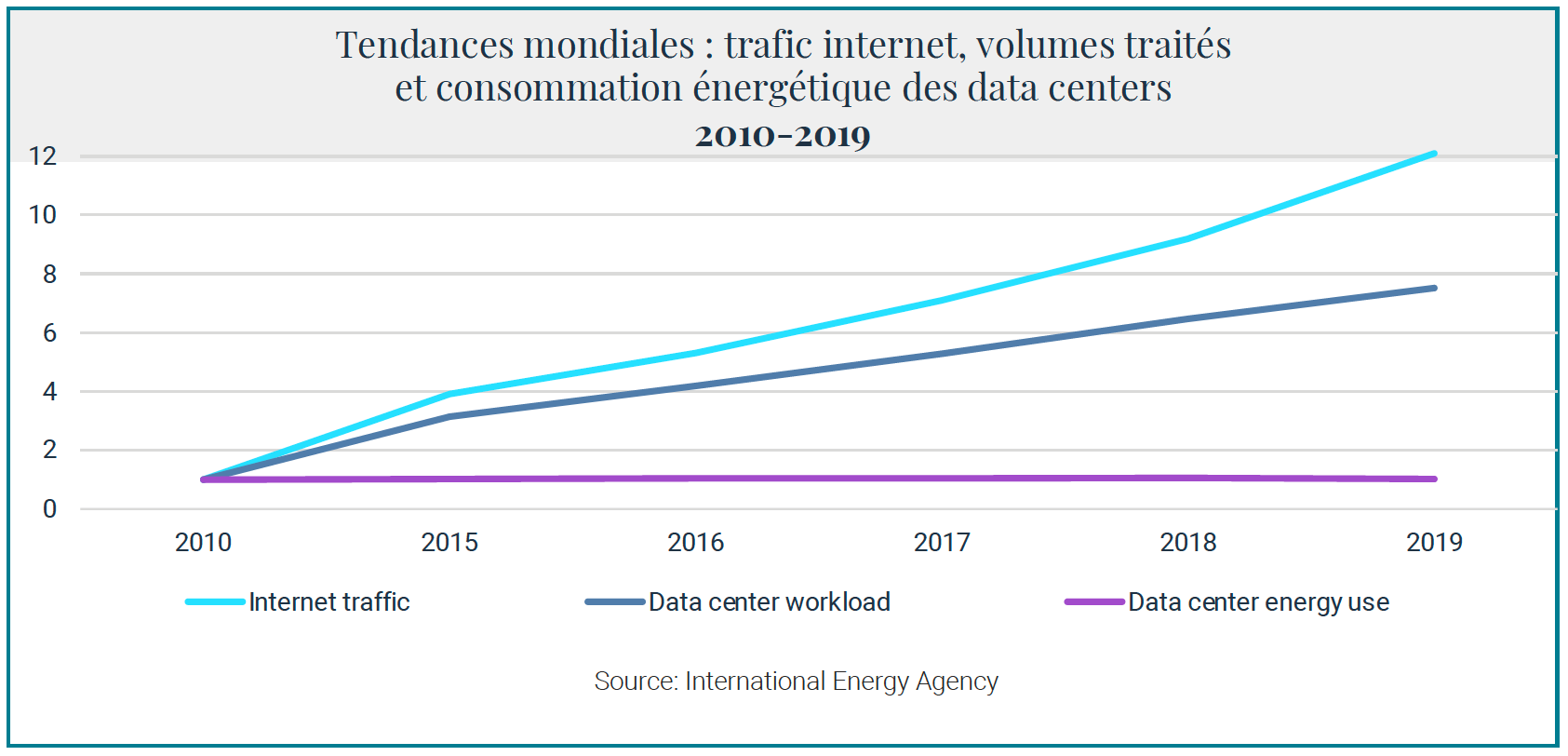L’Odyssée de la Tech
À retenir
- Une des conséquences de la pandémie de Covid-19 a été l’adoption accélérée de certaines technologies, comme le Cloud ou l’e-commerce et une forte prolifération des données.
- Néanmoins, ni les enjeux environnementaux et sociaux auxquels nous sommes confrontés, ni la manière dont la technologie peut y répondre, ont changé.
- Pour les acteurs de la technologie, le développement durable est également un périple, car les solutions ne sont jamais sans risque.
- Notre analyse privilégie les entreprises qui développent des solutions durables, mais s’assure en parallèle que les risques environnementaux et sociaux sont gérés correctement.
Pensez-vous que l’accélération des nouvelles technologies observée durant la crise sanitaire deviendra la « nouvelle normalité » ?
À bien des égards, la pandémie a effectivement favorisé une adoption plus rapide de la technologie, à la fois par les entreprises et par les particuliers. Il était essentiel pour les entreprises de pouvoir se connecter avec leurs clients, leurs fournisseurs et leurs employés, tandis que les particuliers se sont tournés plus que jamais vers les plateformes digitales. Ceci a entraîné une accélération de certaines technologies, comme le Cloud, qui est devenu la solution informatique de choix avec la généralisation du télétravail.
De nombreuses entreprises ont déjà amorcé leur transition vers cette « nouvelle normalité » et les infrastructures de Cloud devraient en tirer profit. Les chiffres parlent d’eux-mêmes : le marché final des services de Cloud public devrait passer de 243 milliards de dollars en 2019 à 362 milliards en 20221. Il est fort probable que le télétravail se poursuive une fois la situation sanitaire revenue à la normale, créant des opportunités pour les entreprises présentes sur les segments des data centers, des serveurs et des logiciels collaboratifs.
La pandémie a également favorisé le développement du e-commerce, qui a élargi sa portée en termes de types d’entreprises, de segments de consommateurs et de produits2. Pour s’adapter, les entreprises ont été contraintes de renforcer leur présence en ligne, ce qui a accentué la prolifération des données, déjà très soutenue avant le début de la crise. Si nous estimons que la Covid-19 a accéléré les principales tendances technologiques, comme le Cloud, la digitalisation, la prolifération des données, et que celles-ci vont durer, nous devons également rester vigilants sur les risques qui se posent en termes de cybersécurité et de confidentialité des données.

Surtout, la crise n’a changé ni les enjeux environnementaux et sociétaux auxquels nous sommes confrontés, ni la manière dont la technologie peut éventuellement y répondre. Nous pensons que sans durabilité, les risques pour nos populations et notre planète pourraient contrebalancer les avantages potentiels offerts par la technologie
Quels sont les critères de durabilité que vous recherchez lorsque vous analysez une valeur technologique ?
Nous regardons les entreprises qui offrent des opportunités de développement durable ou qui gèrent bien leurs risques de durabilité. Cependant, lorsqu’il s’agit de technologie, la durabilité peut devenir un vrai Odyssée, car les solutions ne sont jamais sans risque, notamment pour les entreprises B2C (Business to Consumers).
La technologie est un facilitateur d’innovation. L’équipement informatique, par exemple, est essentiel pour le développement et la mise en place de solutions potentiellement plus durables dans tous les autres secteurs d’activité. Ces outils sont une composante clé pour la filière de l’énergie renouvelable et un soutien fondamental pour le développement socio-économique des pays émergents.
À titre d’exemple, une entreprise produisant des semi-conducteurs pour les panneaux photovoltaïques semble, au premier abord, constituer une opportunité de développement durable intéressante. Mais l’est-elle réellement ? Quels sont les risques ?
Plusieurs facteurs entrent en jeu : les composants emploient des minéraux souvent issus de pays où les atteintes aux droits de l’homme sont très fréquentes (travail des enfants, travail forcé…). De plus, en prenant en compte le coût du cycle de vie, ces produits finissent souvent en déchets non-recyclables !
Les apparences peuvent également être trompeuses si l’on regarde les entreprises qui proposent des applications permettant d’accéder à des informations et à des services bancaires dans les pays émergents, où les situations géopolitiques sont instables. Des mesures de cybersécurité insuffisantes ou une utilisation abusive des données personnelles peut faire courir un risque de perte d’argent ou de violation de la vie privée pour certaines personnes.
Ainsi, si en apparence, la technologie aide les entreprises à effecteur leur transition écologique et sociale, cela n’est pas toujours le cas. C’est pourquoi notre équipe d’analyse s’intéresse aux entreprises qui développent des solutions durables, mais au sein desquelles les risques environnementaux et sociaux sont gérés correctement.
Avez-vous quelques exemples de gestion des risques ?
Nous estimons par exemple que les fabricants de semi-conducteurs doivent mettre en place des mécanismes appropriés pour assurer la traçabilité des minéraux employés. Ces derniers ne doivent être associés à aucun conflit ou violation de droits humains et le processus de raffinage doit être réalisé en minimisant l’impact sur la biodiversité. Nous pensons, par ailleurs, que le secteur du hardware dispose d’une opportunité d’investissement très intéressante, en instaurant une économie circulaire fiable, à grande échelle, qui permettrait d’élargir l’utilisation des matériaux de seconde génération issus des systèmes de recyclage et de valorisation des déchets par l’industrie des semi-conducteurs. Cette démarche aurait l’avantage de remédier à de nombreuses problématiques environnementales et sociales. Nous pensons également qu’en termes de confidentialité des données et d’accès aux informations, les entreprises de télécoms devraient adopter des politiques qui garantissent une non-coopération avec des autorités publiques qui exigeraient un accès aux données utilisateurs en dehors des conventions internationales, ou qui imposeraient des restrictions en termes d’accès à internet et à l’information. Sur ces enjeux, le reporting sur la performance des mécanismes ad hoc reste essentiel, par exemple, sur le nombre de demandes d’informations concernant les utilisateurs par les services de l’État, par type et par recevabilité.
En ce qui concerne les données, il conviendra également de prendre en compte un risque indirect : malgré la prolifération des données observée ces dernières années, les améliorations considérables des performances énergétiques ont contribué à ralentir la demande d’énergie des data centers, qui en en 2019 représentait environ 1 % de la consommation totale d’électricité3.
Cependant, si nous continuons de développer de nouvelles technologies comme la 5G, sans continuer d’améliorer nos performances énergétiques, cela pose un réel risque environnemental.
Selon nous, un grand nombre d’entreprises ont un rôle à jouer pour éviter que l’industrie de la technologie ne devienne un secteur à forte intensité énergétique. La vidéo représente aujourd’hui 66 % du trafic mobile global, un chiffre qui est amené à croître pour atteindre 77 % en 20264.
Or il nous semble que les entreprises peuvent s’abstenir d’intégrer des vidéos autoplay partout et commencer à adapter la résolution de ces vidéos au réseau internet de l’utilisateur (réseau cellulaire ou haut-débit).

1 - Source : Gartner
2 - Source : www.oecd.org/coronavirus/policy-responses/e-commerce-in-the-time-of-covid-19-3a2b78e8/
3 - Source : International Energy Agency (IEA).
4 - Ericsson Mobility Report, 2020.
CFA® et Chartered Financial Analyst® sont des marques déposées du CFA Institute.
Mirova US est une société de conseil en investissement basée aux États-Unis détenue à 100% par Mirova. Mirova opère aux États-Unis à travers Mirova US. L’accord entre Mirova US et Mirova prévoit que Mirova apporte son expertise de gestion et de recherche à Mirova US ; cette dernière l’associe à sa propre expertise afin de conseiller ses clients
Les éléments communiqués reflètent l’opinion de Mirova à la date du document et sont susceptibles de changer sans préavis.

Le monde actuel évolue, tiré par des transitions de long terme dans les domaines de la démographie, de la technologie, de l’environnement et de la gouvernance des entreprises. Dans cet entretien, Amber Fairbanks et Manon Salomez reviennent sur l’impact de la pandémie de Covid-19 sur la gouvernance des entreprises et partagent la vision de Mirova, qui privilégie la création de valeur partagée sur le long terme.

À quelques heures de son investiture, Joe Biden a publié un message sur Twitter : « It’s a new day in America ! » (C'est un jour nouveau pour l'Amérique). Et quelle journée ! Peu après sa prise de fonctions, Joe Biden a annoncé le retour des États-Unis dans l’Accord de Paris, comme il l’avait promis durant sa campagne électorale, (marquant ainsi le début d’une nouvelle ère climatique aux États-Unis et une course globale à la transition vers une économie à émission nette zéro).

Comprendre les marchés, agir sur les marchés, s'engager, mesurer l'impact... Le nouveau numéro de notre newsletter marché est disponible.



